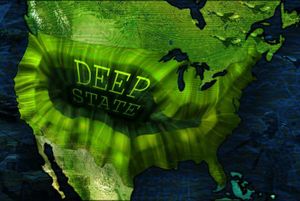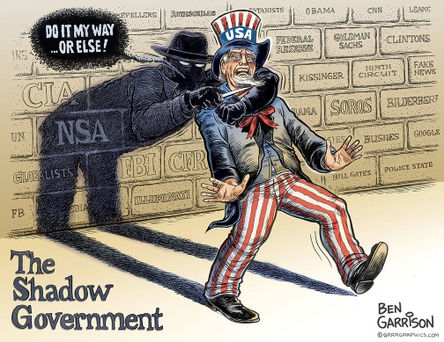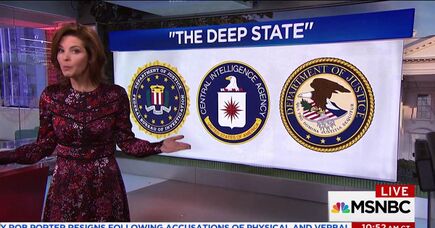Deep state/2017 Popularisation
 | |
| Description | In February 2017, the phrase "deep state" began to be widely used by the corporate media, albeit with only a rough approximation of its original meaning. |
The phrase "Deep state" experienced a surge in popularity in February/March 2017, after some commercially-controlled media outlets began to use it after the 2016 US Presidential election. As WhoWhatWhy observed “All of a sudden, everybody is talking about the Deep State [in connection to USA].” [1] The reasons are somewhat unclear, but it may have been a successor to another ill-conceived project, the "fake news website" smear campaign of a few months earlier. That failed to scare people back to more regular consumption of commercially-controlled mediag. In 2017 the phrase "deep state" was widely aired with multiple disparate meanings, including some which were partisan (and thus in conflict with the basic definition, which is about the structures beneath the facade of party politics. These conflicting meanings gave rise to debate and scepticism of the concept in some corners about whether the phrase was helpful. However, just as the fake news website introduced the phrase "fake news", so the phrase "deep state" has continued in wide usage since 2017, albeit with multiple meanings, which seem to be converging on its usage here. The COVID-19 event confirmed the supranational reach of deep political forces to many people.
Contents
Inconsistent usage
By March 2017, the corporate media was awash with conflicting usages of the term. ABC wrote in March 2017 that in "its current use, the concept has been twisted and broadened,"[2] an acknowledgement that the 2017 version is out of step with the original meaning.
The old official narrative that the US has no "deep state", was still being promoted alongside an opposition narrative that the deep state is a holdover from the Obama government that was fighting Trump for party political reasons. Other commentators were referring to the deep state a kind 'political dark matter' that cannot be directly observed.
The original Turkish (derin devlet) phrase was mentioned in many articles, though the 1996 Susurluk car crash which inspired that phrase was rarely mentioned.[3]
| A 2017 video by WeAreChange on the "Deep State" |
This apparently chaotic set of usages is interesting when considered with the evidence that the deep state controls the corporate media. Those interested in uncovering the original deep state are pointed to the work of the deep politics researcher who coined the term - Peter Dale Scott.
"Fake News"
- Full article:
 “Fake News”
“Fake News”
- Full article:
As with "Fake News", the phrase "deep state" has a range of meanings, generally but not exclusively pejorative. Both phrases were dramatically popularised after the 2016 US Presidential election. Most of those writing about the "deep state" may be unaware that not only is the "deep state" real, but that it has a large degree of control over corporate media. The phrase "Fake news" may well have been launched by the deep state as an effort to stem the rising popularity of non-corporate, independent, uncontrolled media.
2017
February

WhoWhatWhy noted in February 2017 that the term 'Deep State' was as popular as #resistance[4]. In February 2017, the Washington Post wrote that the "deep state" is a "sexy new label being used in Washington to describe embedded anonymous bureaucratic bias against President Trump and Republican rule."[5] While there may be an entrenched bias against Trump by many in congress, to characterise this as the "deep state" is to overlook its fundamentally non-partisan nature. In February 2017, the New York Times wrote that “Though the deep state is sometimes discussed as a shadowy conspiracy, it helps to think of it instead as a political conflict between a nation’s leader and its governing institutions.” [6] This captures the non-partisan nature, but misleads about the extent to which the US President is already a puppet leader.
The deep state, in its original usage had long been agreed to be non-partisan. Mike Lofgren, admittedly a somewhat dubious source,[7] wrote during the administration of Barack Obama in 2014 that “There is the visible government situated around the Mall in Washington, and then there is another, more shadowy, more indefinable government that is not explained in Civics 101 or observable to tourists at the White House or the Capitol. The former is traditional Washington partisan politics: the tip of the iceberg that a public watching C-SPAN sees daily and which is theoretically controllable via elections. The subsurface part of the iceberg I shall call the Deep State, which operates according to its own compass heading regardless of who is formally in power.” [8] Peter Dale Scott approves of this 'iceberg' metaphor for giving an impression of the size of the deep state, but emphasises that it fails to reflect the fluid nature of the deep state.[citation needed]
Old official narrative
The LA Times wrote that "In a country controlled by the deep state, members of the armed forces and intelligence agencies can overthrow presidents they don’t like; that’s what happened in Egypt in 2013. They hold veto power over major decisions. They often run large parts of the economy, or at least enough government contracts to make their families rich. And they’re rarely held accountable for their actions. They act with impunity. U.S. intelligence agencies, on the other hand, are restrained by law."[9] It seems they missed the coups d'etat that have occurred in the US since November 1963.
The Atlantic echoed this official narrative in February 2017, with an article entitled "There Is No American 'Deep State'" which argued that "The deep state was a kind of criminal organization. What we’re witnessing in the U.S., it’s basically institutional channels."[10] The Atlantic's article went so far as to suggest that there are "dangers in allowing a deep state to become a real menace in the mind of the public."[10]
March
In March 2017, CNN, as if hoping to influence the meaning of the phrase even amongst readers who didn't read their piece gave it the headline "What's a 'Deep State' and why is it a new buzzword for the online right?"[11]
“The term ‘Deep State’ has entered established parrot journalism, where it joins ‘the one percent’, the other notion ascended from the internet ‘underground’. You can tell by the way it is now mocked in mainstream publications. I first noticed when one of those informed its readers that it lurked somewhere in the remote internet corners given over to conspiracy theory. And now, quite suddenly, there is a mini avalanche of pieces explaining for example why such a thing may exist in Turkey (where the term was first used) or Egypt, but not the United States where all manner of protections guard against it. David Remnick’s article in the New Yorker reflects considerable confusion in parrot journalism ranks about what to do with this concept that has forced itself on America’s consciousness through the combined maneuvers of state and non-state institutions intending to get rid of the new president.”
Karel van Wolferen (4 April 2017) [12]
2018
A 2018 MSNBC show headlined What is the ‘deep state’ and how dangerous is it? was summarised as follows "Former CIA Operative Glenn Carle, who wrote about the ‘deep state’ conspiracy, explains this idea and why some Trump supporters are pushing it."[13]
Deep state denialism
Not all corporate media has admitted that there is a deep state in the US. Max Fisher headlining a March 2017 New York Times article "What Happens When You Fight a ‘Deep State’ That Doesn’t Exist"[14] and the New Yorker's even more direct "There Is No Deep State".[3] Loren DeJonge Schulman wrote for Politico that "if somebody uses the term “Deep State,” you can be pretty sure they have no idea what they’re talking about."[15]
CNN has been fairly consistent at denying the existence of the US deep state, and in 2018 has been depicting it as a "conspiracy theory" popular with Donald Trump. In November 2018, Z. Byron Wolf headlined a CNN report Trump embraces deep state conspiracy theory.[16] When reporting on Trump's September 2018 claim that the Deep state is a threat to democracy, CNN put the phrase 'deep state' in single quote marks.[17] Reporting on an anonymous New York Times editorial, Z. Byron Wolf took a different tack, headlining a story There may actually be a 'deep state.' It's just not the one Trump fears.[18]
Cultural references
A 2018 espionage drama series was entitled Deep State.[19]
In 2018, the suspected UK deep state functionary, David Aaronovitch went "in search of the Deep State" on BBC Radio 4.[20]
Later Usages
The phrase was originally largely in quotation marks. In March 2020 commercially-controlled media reported when Boris Johnson used the phrase to describe his ousting. The Independent headlined an article Brexit: Boris Johnson suggests Keir Starmer and ‘deep state’ plotting to take UK back into EU, subtitling it PM uses conspiracy theorists’ phrase, as he claims Labour leader will overturn Brexit at ‘drop of a hat’. [21] The phase deep state was more widely used with quotation marks in the 2020s. The Huffington Post also used single quotes when it reported the comment
2020s =
Increasing number of people are speaking of national deep states while at the same time being aware of the supranational deep state in which they are embedded.[citation needed]
Related Quotation
| Page | Quote | Author | Date |
|---|---|---|---|
| Canada/Deep state | “You may have heard the term “deep state” in recent months, especially out of the United States. It is a powerful term, but in Canada its meaning is getting stripped. Up here, “deep state” is in danger of becoming just another term for bureaucratic inertia and a resistant civil service. That distorts the concept, so let’s take a look at this term, and an example of a deep state in Canada.
Democracy depends on a wide range of institutions: political parties; courts, police, and media; non-partisan civil servants and arms-length regulators; and universities with experts who pursue truth wherever evidence may lead. A key feature of democracy is that these institutions are genuinely independent. They are not beholden to any private interest, and are instead loyal to the public interest and obedient to the rule of law. But what happens when public institutions lose their independence? Even more, what happens when a whole series of democratic institutions falls under the sway of one private interest? This would occur, for example, when the governing party, the opposition party, the civil service, universities and regulators all follow the lead of the same private interest. When several key democratic institutions are captured and held by the same private interest, a “deep state” forms. A deep state is an unofficial system of government that arises separately from, but is closely connected to, the official system. It is a public-private hybrid that operates outside public view. In a modern democracy like Canada, a deep state typically comprises leading owners and executives of major private interests and their allies, together with a selection of politicians and bureaucrats tied to the success of those private interests. A successful deep state captures and harnesses the institutions of democracy for its own use. Very few private interests have the resources to establish a deep state. In Canada, one that does is the oil industry.” | Kevin Taft | 6 October 2017 |
Rating
An overview of how the corporate media, after years of ignoring the phrase, suddenly started to talk about the "deep state", possibly an unsuccessful effort to stem its rising popularity.
References
- ↑ http://whowhatwhy.org/2017/02/21/america-discovers-deep-state-welcome-party/ WhoWhatWhy , 21 February 2017
- ↑ http://abcnews.go.com/Politics/wireStory/trump-white-house-sees-influence-shadowy-deep-state-46138623
- ↑ Jump up to: a b http://www.newyorker.com/magazine/2017/03/20/there-is-no-deep-state
- ↑ http://whowhatwhy.org/2017/02/22/russ-baker-medias-deep-state-conversion-moment/
- ↑ https://www.washingtonpost.com/blogs/post-partisan/wp/2017/02/21/the-deep-state-is-real-the-alt-right-is-fake/
- ↑ https://www.nytimes.com/2017/02/16/world/americas/deep-state-leaks-trump.html New York Times , 16 February 2017
- ↑ Lofgren has an apparent blind spot in the area of False Flag attacks
- ↑ http://worldbeyondwar.org/shadow-government-controls-america-notes/ Reader Supported News A Shadow Government Controls America, February 22, 2014
- ↑ http://www.latimes.com/opinion/op-ed/la-oe-mcmanus-deep-state-20170219-story.html
- ↑ Jump up to: a b https://www.theatlantic.com/international/archive/2017/02/why-its-dangerous-to-talk-about-a-deep-state/517221/
- ↑ http://edition.cnn.com/2017/03/07/politics/deep-state/index.html
- ↑ https://www.karelvanwolferen.com/conspiracy-without-conspirators-4-april-2017/
- ↑ https://www.msnbc.com/velshi-ruhle/watch/what-is-the-deep-state-and-how-dangerous-is-it-1156857411929
- ↑ https://www.nytimes.com/2017/03/10/world/americas/what-happens-when-you-fight-a-deep-state-that-doesnt-exist.html
- ↑ http://www.politico.com/magazine/story/2017/03/the-deep-state-is-a-figment-of-steve-bannons-imagination-214892
- ↑ https://edition.cnn.com/2017/11/29/politics/donald-trump-deep-state/index.html
- ↑ https://edition.cnn.com/videos/politics/2018/09/07/donald-trump-deep-state-montana-rally-sot-vpx.cnn/video/playlists/nyt-donald-trump-resistance-op-ed/
- ↑ https://edition.cnn.com/2018/09/06/politics/steve-bannon-trump-conspiracies/index.html
- ↑ https://www.imdb.com/title/tt4785472/
- ↑ https://www.bbc.co.uk/programmes/b0bf6295
- ↑ https://www.independent.co.uk/news/uk/politics/brexit-boris-johnson-eu-deep-state-labour-b2125940.html
- ↑ https://www.huffingtonpost.co.uk/entry/boris-johnson-deep-state-overturn-brexit_uk_62d59250e4b0f6913032c504

